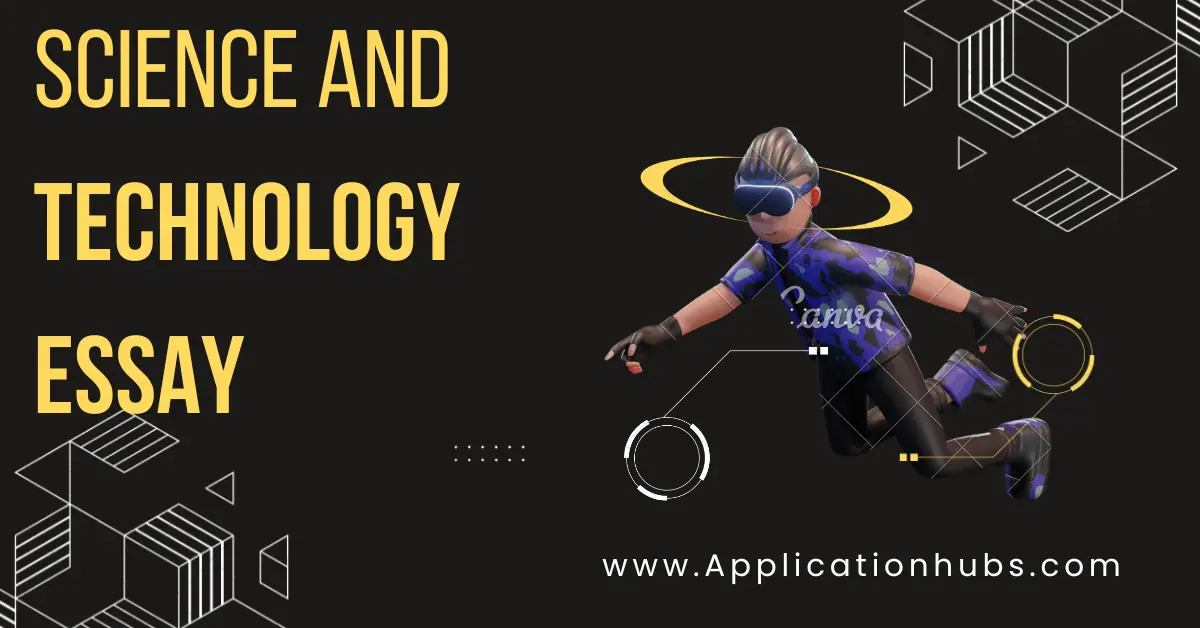Embark on a compelling journey through the realms of progress with a comprehensive exploration in the essay, “600+ Words of Essay on Science and Technology.” Discover the intricate tapestry woven by scientific breakthroughs and technological marvels, all while reflecting on the significance of these advancements, akin to the vibrant celebration of a festival. Unravel their profound implications on society, economy, healthcare, and the intricacies of our daily existence.
150+ Words Of Essay On Science Is A Blessing For Classes 1 To 5
Science, undoubtedly, has been a blessing to humanity in limitless ways. Here are some key factors as to why science is a blessing:
Advancements in Medicine: Science has led to the discovery and development of life-saving drugs, scientific procedures, and applied sciences that have substantially increased existence expectancy and extended the high quality of existence for infinite people.
Technological Innovations: Science has provided us with the means to improve our life’ efficiency, enjoyment, and convenience. Science has created cellphones and high-speed rail, two innovations that have considerably changed the way we live and work.
Environmental Protection: Science aids in understanding and solving environmental issues like pollution and climate change, fostering sustainable solutions for future generations.
Agricultural Advancements: Science has performed an essential role in enhancing crop yields, developing disease-resistant plants, and increasing meal manufacturing to feed a growing international population.
In conclusion, science has certainly been a blessing to humanity, providing us with the information and equipment to decorate our lives and guard the planet.
300+ Words Of Essay On Science And Technology In Future For Classes 6 To 10
The Future of Science and Technology
Introduction
Science and technological know-how have always been closely intertwined, driving each other’s progress. It is evident that they will continue to play a crucial role in forming the globe when we look ahead.This essay examines future scientific and technological developments and provides insights into significant breakthroughs that are expected in the coming years.
Artificial Intelligence
geniusOne of the most giant developments in science is the rapid development of synthetic Genius (AI). AI has the potential to revolutionize a variety of industries, from healthcare and finance to transportation and entertainment. Advancements in machine learning and deep learning will enhance AI’s ability to perform complex tasks more accurately and efficiently.
Space Exploration
The future of area exploration is additionally promising, with progressive technologies being developed to discover and colonize other planets. From reusable rockets to advanced propulsion systems, the next few years may see people setting foot on Mars and even beyond.
“Science and everyday life cannot and should not be separated.” – Rosalind Franklin
Biotechnology
Advancements in biotechnology will continue to have a profound influence on healthcare and the environment. With gene-modifying equipment like CRISPR-Cas9, scientists may additionally be able to remedy genetic illnesses and develop new remedies for quite a number of clinical conditions. Furthermore, biotechnology will play a crucial role in creating sustainable agriculture and combating climate change.
Renewable Energy
The need for clean and renewable energy sources will only increase as the globe struggles with climate change. Innovations in solar, wind, and tidal energy will increase accessibility and effectiveness, paving the way for a sustainable future.
Conclusion
The future of science and technology is rather exciting, with limitless probabilities for innovation and progress. As we proceed to push the boundaries of what is possible, it is essential to make certain that these developments are used responsibly and ethically for the betterment of humanity. With endured investment in lookup and development, the future is shiny for science and technology.
600+ Words of Essay on Science and Technology in the Future for Classes 11, 12, and…
Science and technology have played a pivotal role in shaping the world as we understand it today. From historic innovations to modern-day advancements, these two fields have drastically impacted human life, society, and the environment. In this essay, we will discover the ancient context, key figures, and impact of science and technology, figuring out influential humans who have contributed to these fields. We will also talk about a wide variety of views and provide a well-reasoned comparison of both the splendid and bad aspects, as well as potential future features associated with science and technology.
Historical Context of Science and Technology
Science has its roots in the past, in the cultures of Mesopotamia, Egypt, and Greece. These prehistoric societies done considerable advancements in fields like engineering, astronomy, mathematics, and medicine.
Scientific information and technological innovation saw an excellent upsurge during the Renaissance. Because of this technology, there was a resurgence of interest in analyzing nature, which resulted in novel discoveries and resourceful ideas. During this period, extraordinary individuals who made substantial contributions to science and mathematics consisted of Johannes Kepler, Leonardo da Vinci, and Galileo Galilei. The way we view the natural world has been completely changed with the aid of Kepler’s guidelines for planetary movement, Galileo’s telescopic observations, and Da Vinci’s drawings and inventions.
The Impact of Science and Technology
The world has been greatly impacted by science. New technology, scientific discoveries, and advancements in spoken commerce and transportation have all resulted from these sectors. The Industrial Revolution, which was once pushed through scientific and technological advancements, modified society and the economic system due to the upward jostle of factories, urbanization, and new modes of transportation.
“Science is the poetry of reality.” – Richard Dawkins
In the modern era, science and technological know-how continue to structure our daily lives. The improvement of computers, the internet, and mobile units has revolutionized conversation and document access. Medical developments such as vaccines, antibiotics, and surgical techniques have extended human lifespans and expanded the scope of life. Moreover, harnessing renewable energy from sources like solar and wind offers sustainable solutions to environmental challenges.
Influential Individuals in Science and Technology
Throughout history, there have been quite a few men and women who have made huge contributions to the fields of science and technology. One such figure is Isaac Newton, whose legal theories of motion and regular gravitation laid the groundwork for classical mechanics and modern-day physics. Nikola Tesla, a pioneer in electrical engineering, contributed to the development of alternating current (AC) strength systems, which are nevertheless broadly used today.
A pioneer in the field of radioactivity research, scientist and chemist Marie Curie was also the first female Nobel laureate. The disciplines of chemistry and physics have been significantly impacted by her work.
“Science is a way of thinking much more than it is a body of knowledge.” – Carl Sagan
Steve Jobs and Bill Gates transformed technology with personal computing and software innovations in recent years.
Negative Aspects of Science and Technology
While science and technological know-how have made a number of advancements, there are also negative factors to consider. The speedy development of technological expertise has led to worries about privacy, security, and moral implications. The improvement of nuclear weapons, genetic engineering, and artificial intelligence raises questions about the achievable misuse and penalties of these technologies. Additionally, the reliance on fossil fuels for electricity has resulted in environmental degradation and nearby weather change.
The Future of Science and Technology
Looking ahead, the future of science holds both promise and uncertainty. Emerging fields such as biotechnology, nanotechnology, and quantum computing provide plausible solutions to global challenges but additionally enlarge moral and societal dilemmas. The integration of artificial intelligence into more than a few industries has the potential to streamline approaches, but it also raises issues about job displacement and report privacy.
In conclusion, science and technological knowledge have had a profound impact on the world, shaping human information and the way we live. Diverse disciplines have spurred progress, from ancient civilizations to contemporary technologies. However, as technology advances, ethical issues and disadvantages must be carefully considered.
FAQ’s
What is the role of science and technology in the future?
- Advancements in science and technology will drive innovation, transforming industries and improving efficiency.
- Scientific discoveries will address global challenges, from climate change to healthcare.
- Technology will enhance communication, connectivity, and access to information.
- Artificial intelligence will play a crucial role in decision-making and problem-solving.
- Science and technology will shape the future of education, creating new learning methods and opportunities.
What are the five purposes of science and technology?
- Understanding Nature: Science explores the natural world’s fundamental principles.
- Problem-Solving: Both science and technology address real-world challenges through systematic inquiry and innovative solutions.
- Innovation and Advancement: Technology’s primary purpose is to innovate and advance society.
- Quality of Life: Science and technology contribute to improving human life, developing medical treatments and enhancing living conditions.
- Empowering Societies: By providing knowledge and tools, science and technology empower societies for progress and development.
Write Any seven benefits of technology?
- Efficiency: Technology streamlines processes, increasing efficiency.
- Communication: Enhances global connectivity and information sharing.
- Innovation: Drives continuous development and problem-solving.
- Accessibility: Provides access to information and services.
- Medical Advancements: Improves healthcare and treatment methods.
- Automation: Enhances productivity and reduces manual labor.
- Quality of Life: Technology contributes to improved living standards and convenience.

